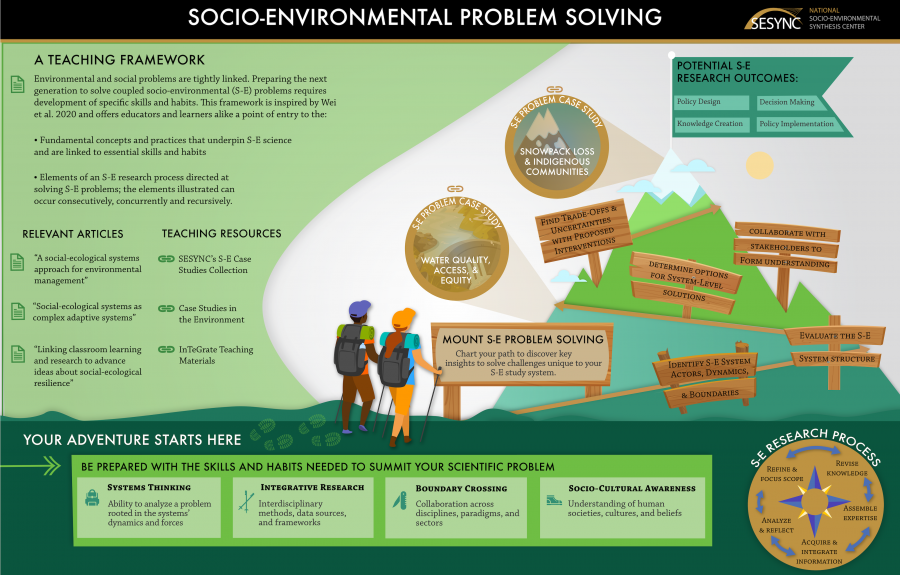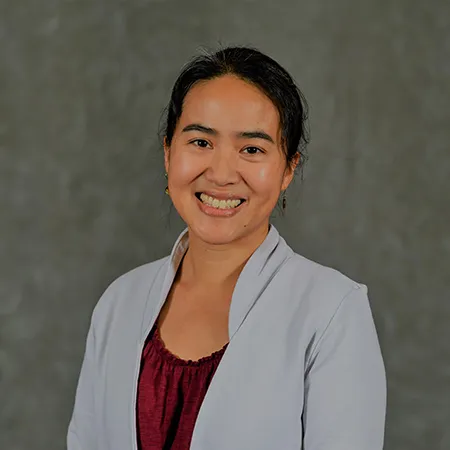Our "Teaching Socio-Environmental (S-E) Problem Solving" infographic is a guide for educators, looking to equip their students with the tools needed to tackle complex S-E issues. This resource introduces core concepts, processes, and skills needed for scholars to effectively address S-E challenges, while developing innovative sustainable solutions—inspired by the article "A framework for teaching socio-environmental problem-solving" by Wei et al. Come along for the adventure to discover key insights and resources to enrich your next learning experience.
To view in your browser and/or download it, click the PDF below.
-
About the Presenters
Cynthia Wei
Associate Director of EducationDr. Cynthia Wei was the Associate Director of Education at SESYNC from 2016 to 2018 and previously the Assistant Director of Education and Outreach from 2012 to 2016. In this role, she led and managed educational programs including the SESYNC undergraduate research internship and the postdoctoral fellowship program (co-led), as well as initiatives to broaden participation with underrepresented minorities. She also created and taught an annual short course to advance the teaching of socio-environmental synthesis using the case study approach; this effort resulted in education-focused SESYNC...
Cynthia Wei
Associate Director of EducationDr. Cynthia Wei was the Associate Director of Education at SESYNC from 2016 to 2018 and previously the Assistant Director of Education and Outreach from 2012 to 2016. In this role, she led and managed educational programs including the SESYNC undergraduate research internship and the postdoctoral fellowship program (co-led), as well as initiatives to broaden participation with underrepresented minorities. She also created and taught an annual short course to advance the teaching of socio-environmental synthesis using the case study approach; this effort resulted in education-focused SESYNC workshops, multiple publications and presentations, and a virtual collection of open-access case studies on SESYNC’s website.
These efforts built on Cindy's past experience with national-level science education initiatives as an American Association for the Advancement of Science (AAAS) Science and Technology Policy Fellow at the National Science Foundation’s Division of Undergraduate Education, and as a Christine Mirzayan Fellow at the National Academy of Sciences. Her past scientific research involved animal cognition, having researched behavior and navigation in honeybees during her PhD and social cognition in corvids as a postdoctoral research associate.
Currently, Cindy is an Associate Professor of Teaching and Director of Science Education within the Science, Technology and International Affairs (STIA) program at Georgetown University’s Walsh School of Foreign Service (SFS). There, she leads the Science For All (SFA) program within the SFS and teaches several courses. She also has served as co-editor for the Ecology and Biodiversity section of the journal, Case Studies in the Environment. She holds a PhD in Ecology, Evolutionary Biology and Behavior, and Zoology from Michigan State University, and a BA in Biology (Neurobiology and Behavior) from Cornell University.
External Links:
https://gufaculty360.georgetown.edu/s/contact/0033600001kwDSvAAM/cynthia-wei
https://scholar.google.com/citations?user=_Nfjy9EAAAAJ&hl=en&oi=sra

